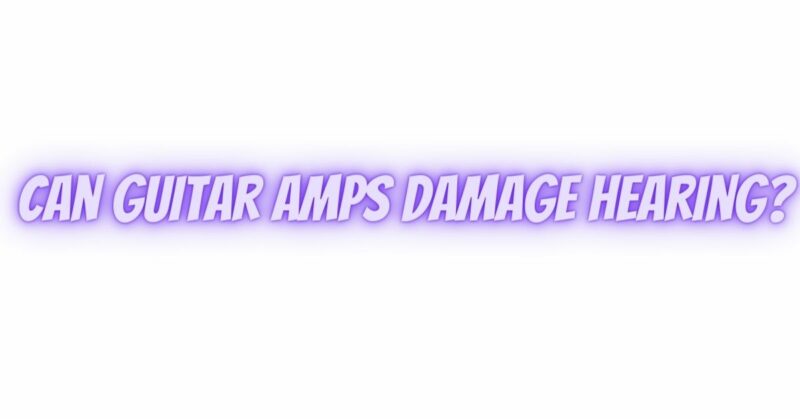Guitar amplifiers are powerful tools that allow musicians to project their instrument’s sound and shape its tone. While they are essential for live performances and recording, they also have the potential to produce high sound levels that can pose a risk to hearing health. In this article, we will explore whether guitar amps can damage hearing, the factors involved, and how musicians can protect their ears while enjoying the benefits of amplification.
Understanding Sound Levels
Sound is measured in units called decibels (dB), and the intensity of sound increases exponentially with each additional dB. Here are some common reference points for sound levels:
- Normal conversation: 60-70 dB
- Live rock concert: 110-120 dB
- Jet engine at takeoff: 130-140 dB
- Threshold of pain: 130-140 dB
Guitar amplifiers can produce sound levels that fall within or even exceed the range of a live rock concert, depending on the amplifier’s power and the guitarist’s playing style.
Factors Contributing to Hearing Damage
Several factors contribute to the potential for hearing damage when using guitar amplifiers:
1. Amplifier Wattage:
Amplifiers come in various wattage ratings. Higher-wattage amps are capable of producing louder sound levels. Musicians who use high-wattage amplifiers may be exposed to higher sound pressures that can be damaging if not managed correctly.
2. Proximity to the Amplifier:
The distance between the musician and the amplifier significantly affects the sound level reaching their ears. Standing very close to a powerful amplifier can expose the guitarist to dangerously high sound levels.
3. Volume Settings:
Musicians can control the amplifier’s volume, and some may be tempted to play at extremely high volumes for various reasons, including achieving a desired tone or stage presence. Prolonged exposure to loud volumes can harm hearing over time.
4. Playing Style:
The playing style of the guitarist also plays a role. Aggressive strumming, heavy distortion, and extended periods of loud playing can generate higher sound levels.
Hearing Damage and Tinnitus
Exposure to loud music and sound levels can lead to two common hearing-related issues:
1. Hearing Loss:
Prolonged exposure to high volumes can cause permanent damage to the delicate hair cells in the inner ear, leading to hearing loss. This hearing loss can be gradual and often goes unnoticed until it becomes significant.
2. Tinnitus:
Tinnitus is the perception of ringing, buzzing, or other noises in the ears when no external sound source is present. It can be a result of exposure to loud music and is a common symptom of noise-induced hearing damage.
Protecting Your Hearing
Musicians can take several steps to protect their hearing while using guitar amplifiers:
1. Use Ear Protection:
Musicians should consider using earplugs or custom-fitted musician’s earplugs that reduce sound levels while preserving sound quality. These earplugs are designed to attenuate harmful frequencies while maintaining clarity.
2. Monitor Volume Levels:
Guitarists should be mindful of the amplifier’s volume settings and avoid excessive levels during practice, performance, or recording. Soundcheck and rehearsal volumes should also be kept at safe levels.
3. Use Isolation Cabinets or Sound Shields:
Isolation cabinets or sound shields can help contain the sound from amplifiers, reducing the exposure to loud volumes. These can be especially useful in recording studios or smaller rehearsal spaces.
4. Take Breaks:
Musicians should take regular breaks during rehearsals or performances to give their ears a rest and reduce the cumulative exposure to high sound levels.
Conclusion
Guitar amplifiers, especially when used at high volumes, have the potential to damage hearing over time. Musicians who use amplifiers should prioritize hearing protection and responsible sound management to enjoy the benefits of amplification while safeguarding their long-term auditory health. By using ear protection, monitoring volume levels, and taking precautions, guitarists can continue to make music without sacrificing their hearing. Hearing is a precious sense, and preserving it is essential for musicians to enjoy their craft for years to come.


